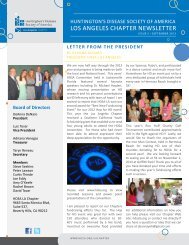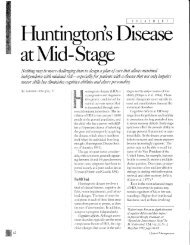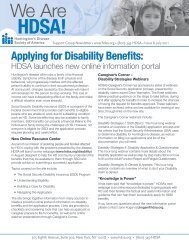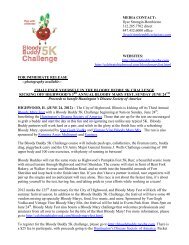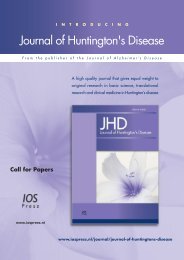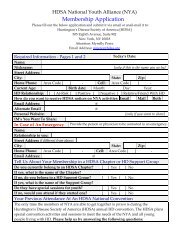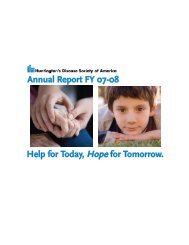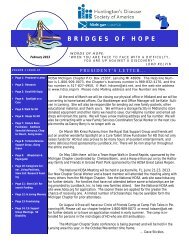Understanding Behavior in HD.final.8-18-05 - Huntington's Disease ...
Understanding Behavior in HD.final.8-18-05 - Huntington's Disease ...
Understanding Behavior in HD.final.8-18-05 - Huntington's Disease ...
Create successful ePaper yourself
Turn your PDF publications into a flip-book with our unique Google optimized e-Paper software.
11<br />
In general, ma<strong>in</strong>tenance of an <strong>in</strong>dividual’s personality is critical to cop<strong>in</strong>g with loss due to <strong>HD</strong>. Often<br />
people worry that if they get <strong>HD</strong>, they will lose their <strong>in</strong>dividuality and be just like their affected parent.<br />
Whether or not this is a rational fear, efforts can be made to assure people with <strong>HD</strong> that their unique aspects<br />
as a person are appreciated, even though they have <strong>HD</strong> and may no longer be able to participate directly <strong>in</strong><br />
favorite pastimes. What activities does the <strong>in</strong>dividual most enjoy? Is the person a sports fan? An opera or<br />
theatre buff? A rap enthusiast? A heavy metal fanatic? Country-western star wanna-be? Tape players can help<br />
provide much enjoyment by ma<strong>in</strong>ta<strong>in</strong><strong>in</strong>g favorites. Books on tape can be enjoyed when eye track<strong>in</strong>g makes<br />
read<strong>in</strong>g difficult. Videos can provide humor, ball games and old classics. What colors does the <strong>in</strong>dividual most<br />
enjoy? Wild, busy fabrics <strong>in</strong> oranges and reds, or solid, calm blues and purples? Colors, special decorations,<br />
and pictures from the kids and grandkids should all be used to ma<strong>in</strong>ta<strong>in</strong> the identity of an <strong>in</strong>dividual who<br />
happens to have <strong>HD</strong>.<br />
OTHER HEALTH FACTORS<br />
ACUTE AND CHRONIC ILLNESS<br />
Although <strong>HD</strong> can become the primary focus of attention, people with <strong>HD</strong> can have other medical<br />
problems. This is important to remember and consider when try<strong>in</strong>g to understand behaviors. Pneumonia,<br />
fever, ur<strong>in</strong>ary <strong>in</strong>fection, hemorrhoids, a cold or flu, gynecological problems, chronic illness such as arthritis<br />
and diabetes, and the natural ag<strong>in</strong>g process, <strong>in</strong>clud<strong>in</strong>g menopause, can lead to changes <strong>in</strong> behavior. It is not<br />
always easy to identify health problems <strong>in</strong> people with <strong>HD</strong> due to speech problems, word-f<strong>in</strong>d<strong>in</strong>g problems and<br />
lack of self-awareness. Health conditions should be watched, and any sudden changes <strong>in</strong> behavior should be<br />
reported to a doctor.<br />
FOOD REACTIONS<br />
It is wise to be aware of the tendency of friends and relatives to suggest the need for herbs, special diets<br />
and so on. These suggestions should not be forbidden but generally they should be discussed first with the<br />
primary physician. Some herbs and foods (such as grapefruit juice) have major <strong>in</strong>teractions with some<br />
medications.<br />
DEHYDRATION<br />
Persons with <strong>HD</strong>, <strong>in</strong> the mid to late stages particularly, may not recognize the sensation of thirst or be able<br />
to <strong>in</strong>itiate gett<strong>in</strong>g a dr<strong>in</strong>k. As a result, they may become dehydrated. The symptoms of dehydration may <strong>in</strong>clude<br />
dizz<strong>in</strong>ess, confusion, refusal to dr<strong>in</strong>k, dry sk<strong>in</strong>, fever, flushed appearance and a rapid pulse.<br />
FATIGUE<br />
Persons with <strong>HD</strong> often need to spend greater amounts of energy to perform regular activities of day-to-day<br />
life, to control emotions and to adjust to the cont<strong>in</strong>ual changes <strong>in</strong> their capabilities. Many <strong>in</strong>dividuals require<br />
additional sleep to avoid fatigue that can contribute to <strong>in</strong>creased behavioral difficulties. Plan daily rout<strong>in</strong>es to



